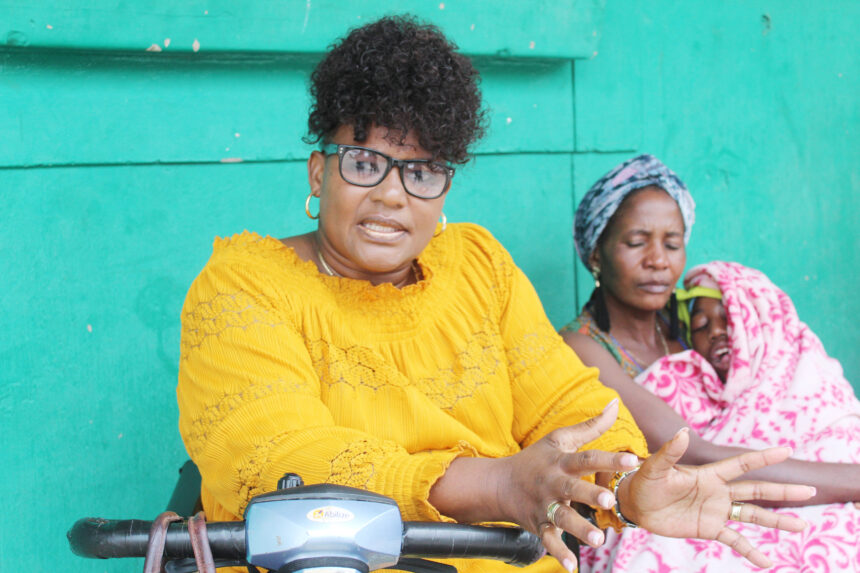Lahja Nashuuta
Swapo backbencher Alexia Manombe-Ncube has called on the government to ensure equal access for persons with disabilities (PWDs) to the physical environment, transportation, information and communication technologies.
She said the national budget must include dedicated funding for disability-inclusive gender programmes to ensure no one is left behind in Namibia’s pursuit of equality.
“These are rights, not privileges. They require deliberate planning, adequate funding, and sustained action,” she said.
Citing the words of late president Hage Geingob, Manombe-Ncube emphasised that “inclusivity spells harmony, and exclusivity spells conflict” and reminded Namibians that “an inclusive Namibia is a stronger Namibia that thrives when no one is left behind.”
She acknowledged the role of the Ministry of Gender Equality and Child Welfare in coordinating efforts for vulnerable populations but stressed the need to enhance its impact. Specifically, she highlighted the importance of promoting gender equality among men and women with disabilities, who often face double discrimination, both based on disability and gender.
“Empowerment must move beyond welfare. It must include support for business ventures and entrepreneurship initiatives tailored to people with disabilities, enabling them to become economically self-reliant contributors to society. This requires clear budget allocations for seed funding, training, and accessible infrastructure,” Manombe-Ncube argued while making her contribution to the 2025/2026 financial year’s budget.
She also raised concern about the rising cases of child abuse, particularly against children with disabilities, who are often voiceless or overlooked.
“There’s a pressing need to strengthen child protection laws, ensure their effective enforcement, and enhance support systems,” she stated.
She said budgetary provisions must be made for expanding social work services, community outreach and inclusive reporting mechanisms.
On gender-based violence (GBV), she described violence against persons with disabilities as “a serious and often hidden issue”.
“Many victims struggle to access justice due to communication barriers, social stigma and inaccessible reporting systems,” she said.
She stated that GBV responses must be inclusive and responsive to the unique challenges faced by people with disabilities.
“The national budget must reflect this through funding for accessible shelters, police training, and awareness campaigns tailored to the needs of persons with disabilities,” Manombe-Ncube said while also calling for prioritising assistive technologies such as wheelchairs, hearing aids, screen readers and braille devices.
“These are essential health products just as vital as any medication. Given their growing importance, it’s time to elevate their priority in our health budgets and procurement processes to ensure timely and equitable access for all,” said the MP.
While she acknowledged progress made in education through the Sector Policy on Inclusive Education and the Education Act of 2001, Manombe-Ncube said more investment is needed to realise truly-inclusive learning environments.
“This includes upgrading infrastructure, developing learning materials, and training educators in specialised methods such as sign language and braille. The fact that some learners still can’t attend school due to accessibility challenges shows that we still have room to grow.”
In terms of infrastructure and transport, she also advocated for a stronger commitment to universal design.
“Whether it’s public buses, taxis or walkways, we must integrate accessibility for wheelchair users and individuals with sensory impairments into transport planning and service provision,” she said. “A dedicated accessibility fund under the ministry of transport could help support such initiatives,” she stated.
Turning to rural economies, Manombe-Ncube pointed out that most PWDs rely on subsistence farming.
She proposed inclusive agricultural programmes that consider mobility limitations by providing adapted tools, transport support, and accessible training.
“These initiatives would enhance both food security and economic participation.”
She also urged the government to ensure that persons with disabilities have access to national resources, including marine wealth.
“There’s an opportunity to make fish quota allocations more inclusive,” the politician said, “perhaps by allowing PWDs, their cooperatives and representative associations to benefit. This would align with our broader goals for equitable economic development.”


